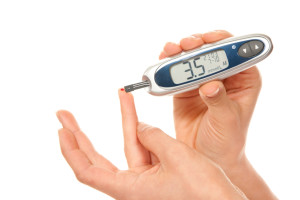It is very im portant to test your blood sugar. There are several meters that you can use to test it. Meters are available at any community pharmacy.
portant to test your blood sugar. There are several meters that you can use to test it. Meters are available at any community pharmacy.
Test your blood sugar regularly. Take the results with you to your doctor appointments. This will help you discover your blood sugar patterns. Your blood sugars may vary greatly at different times of the day. Together, you and your doctor should decide on blood sugar goals and determine when it is necessary to call the office or clinic between scheduled appointments.
NORMAL Range for blood sugar:
Before eating: 80-120*
2 hours after eating: Less than 140*
*other resources may give you slightly different normal ranges for blood sugar.
HYPOglycemia
Low blood sugar, or hypoglycemia, occurs when your blood sugar is below 70. Ask your provider or educator what blood sugar levels to look out for when you suspect hypoglycemia and when you need to call your provider or go to the nearest hospital emergency room.
Symptoms of Low Blood Sugar:
- Shaking
- Fast heartbeat
- Sweating
- Dizziness
- Anxiousness
- Irritability
- Hunger
- Impaired or blurry vision
- Weakness and fatigue
- Headache
Causes:
- Too much insulin or diabetes medication
- Too little food, or a delayed meal
- Too much exercise
- Alcohol on an empty stomach
Tips to Prevent Hypoglycemia:
- Eat every 4-5 hours.
- Do not exercise without first checking your blood sugar.
- If your blood sugar is less than 100, eat a snack before the activity.
- Take your medications as instructed.
- Teach family and friends how they can help you if you have low blood sugar.
- Do not drive if you have low blood sugar.
- Always carry a fast-acting carbohydrate (glucose tablets or candies).
- For repeat low blood sugars, contact your physician.
If you become confused or unconscious, have family or friends call 911. Retest blood sugar within 15 minutes after treatment.
HYPERglycemia
High blood sugar, or hyperglycemia, occurs when your blood sugar is over 200. Ask your provider or educator what blood sugar levels to look out for when you suspect hyperglycemia and when you need to call your provider or go to the nearest emergency room.
Symptoms of High Blood Sugar:
- Extreme thirst
- Hunger
- Frequent urination
- Dry skin
- Blurred vision
- Drowsiness
- Wounds take longer to heal
Causes:
- Too much food, too little insulin or diabetes medication
- Illness, stress, certain medications (ex. corticosteroids)
Tips to Prevent Hyperglycemia:
- Test your blood sugar more often
- Call your doctor if your blood sugars are over 200 for several tests or for two days.
